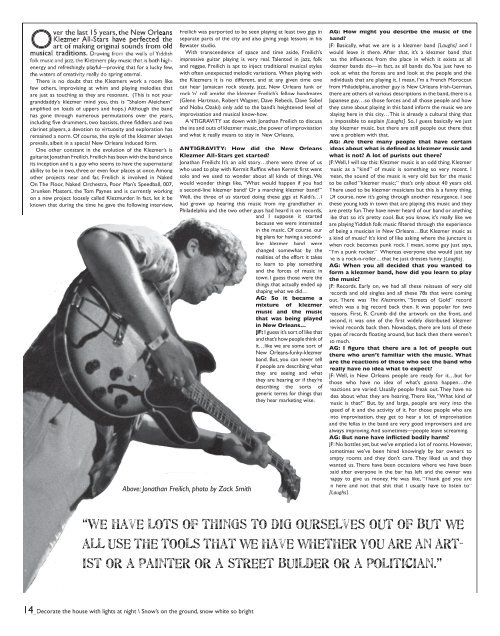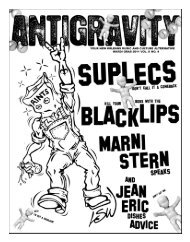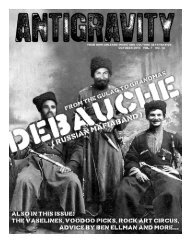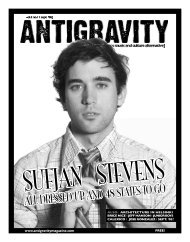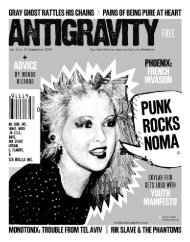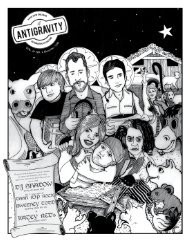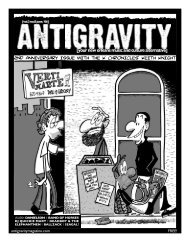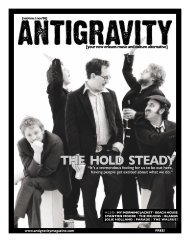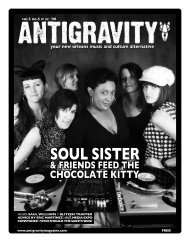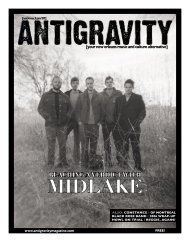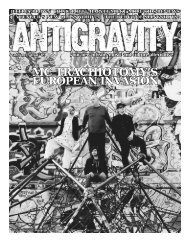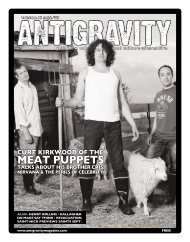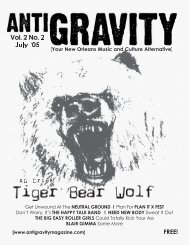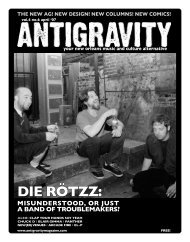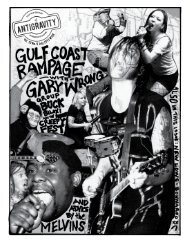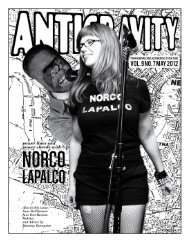April 2006 (PDF) - Antigravity Magazine
April 2006 (PDF) - Antigravity Magazine
April 2006 (PDF) - Antigravity Magazine
You also want an ePaper? Increase the reach of your titles
YUMPU automatically turns print PDFs into web optimized ePapers that Google loves.
O<br />
energy and refreshingly playful—proving that for a lucky few,<br />
There is no doubt that the Klezmers work a room like<br />
few others, improvising at whim and playing melodies that<br />
are just as touching as they are resonant. (This is not your<br />
granddaddy’s klezmer mind you, this is “Shalom Aleichem”<br />
amplifi ed on loads of uppers and hops.) Although the band<br />
has gone through numerous permutations over the years,<br />
including fi ve drummers, two bassists, three fi ddlers and two<br />
clarinet players, a devotion to virtuosity and exploration has<br />
remained a norm. Of course, the style of the klezmer always<br />
prevails, albeit in a special New Orleans induced form.<br />
One other constant in the evolution of the Klezmer’s is<br />
guitarist Jonathan Freilich. Freilich has been with the band since<br />
its inception and is a guy who seems to have the supernatural<br />
ability to be in two, three or even four places at once. Among<br />
other projects near and far, Freilich is involved in Naked<br />
On The Floor, Naked Orchestra, Poor Man’s Speedball, 007,<br />
Drunken Masters, the Tom Paynes and is currently working<br />
on a new project loosely called Klezmurder. In fact, let it be<br />
known that during the time he gave the following interview,<br />
Freilich was purported to be seen playing at least two gigs in<br />
separate parts of the city and also giving yoga lessons in his<br />
Bywater studio.<br />
With transcendence of space and time aside, Freilich’s<br />
impressive guitar playing is very real. Talented in jazz, folk<br />
and reggae, Freilich is apt to inject traditional musical styles<br />
with often unexpected melodic variations. When playing with<br />
the Klezmers it is no different, and at any given time one<br />
can hear Jamaican rock steady, jazz, New Orleans funk or<br />
rock ‘n’ roll amidst the klezmer. Freilich’s fellow bandmates<br />
(Glenn Hartman, Robert Wagner, Dave Rebeck, Dave Sobel<br />
and Nobu Ozaki) only add to the band’s heightened level of<br />
improvisation and musical know-how.<br />
ANTIGRAVITY sat down with Jonathan Freilich to discuss<br />
the ins and outs of klezmer music, the power of improvisation<br />
and what it really means to stay in New Orleans.<br />
ANTIGRAVITY: How did the New Orleans<br />
Klezmer All-Stars get started?<br />
Jonathan Freilich: It’s an old story…there were three of us<br />
who used to play with Kermit Ruffi ns when Kermit fi rst went<br />
solo and we used to wonder about all kinds of things. We<br />
would wonder things like, “What would happen if you had<br />
a second-line klezmer band? Or a marching klezmer band?”<br />
Well, the three of us started doing these gigs at Kaldi’s…I<br />
had grown up hearing this music from my grandfather in<br />
Philadelphia and the two other guys had heard it on records,<br />
and I suppose it started<br />
because we were interested<br />
in the music. Of course, our<br />
big plans for having a second-<br />
line klezmer band were<br />
changed somewhat by the<br />
realities of the effort it takes<br />
to learn to play something<br />
and the forces of music in<br />
town. I guess those were the<br />
things that actually ended up<br />
shaping what we did…<br />
AG: So it became a<br />
mixture of klezmer<br />
music and the music<br />
that was being played<br />
in New Orleans…<br />
JF: I guess it’s sort of like that<br />
and that’s how people think of<br />
it…like we are some sort of<br />
New Orleans-funky-klezmer<br />
band. But, you can never tell<br />
if people are describing what<br />
they are seeing and what<br />
they are hearing or if they’re<br />
describing the sorts of<br />
generic terms for things that<br />
they hear marketing wise.<br />
Above: Jonathan Freilich, photo by Zack Smith<br />
AG: How might you describe the music of the<br />
band?<br />
JF:<br />
Basically, what we are is a klezmer band [Laughs] and I<br />
would leave it there. After that, it’s a klezmer band that<br />
has the infl uences from the place in which it exists as all<br />
klezmer bands do—in fact, as all bands do. You just have to<br />
look at what the forces are and look at the people and the<br />
individuals that are playing it. I mean, I’m a French Moroccan<br />
from Philadelphia, another guy is New Orleans Irish-German,<br />
there are others of various descriptions in the band, there is a<br />
Japanese guy…so those forces and all those people and how<br />
they came about playing in this band inform the music we are<br />
playing here in this city…This is already a cultural thing that<br />
is impossible to explain [Laughs]. So, I guess basically we just<br />
play klezmer music, but there are still people out there that<br />
have a problem with that.<br />
AG: Are there many people that have certain<br />
ideas about what is defined as klezmer music and<br />
what is not? A lot of purists out there?<br />
JF:<br />
Well, I will say this: Klezmer music is an odd thing. Klezmer<br />
music as a “kind” of music is something so very recent. I<br />
mean, the sound of the music is very old but for the music<br />
to be called “klezmer music;” that’s only about 40 years old.<br />
There used to be klezmer musicians but this is a funny thing.<br />
Of course, now it’s going through another resurgence. I see<br />
these young kids in town that are playing this music and they<br />
are pretty fun. They have never heard of our band or anything<br />
like that so it’s pretty cool. But you know, it’s really like we<br />
are playing Yiddish folk music fi ltered through the experience<br />
of being a musician in New Orleans…But Klezmer music as<br />
a kind of music? It’s kind of like asking where the juncture is<br />
when rock becomes punk rock. I mean, some guy just says,<br />
“I’m a punk rocker.” Whereas everyone else would just say<br />
he is a rock-n-roller…that he just dresses funny [Laughs].<br />
AG: When you all decided that you wanted to<br />
form a klezmer band, how did you learn to play<br />
the music?<br />
JF:<br />
Records. Early on, we had all these reissues of very old<br />
records and old singles and all these 78s that were coming<br />
out. There was The Klezmorim, “Streets of Gold” record<br />
which was a big record back then. It was popular for two<br />
reasons. First, R. Crumb did the artwork on the front, and<br />
second, it was one of the fi rst widely distributed klezmer<br />
revival records back then. Nowadays, there are lots of these<br />
types of records fl oating around, but back then there weren’t<br />
so much.<br />
AG: I figure that there are a lot of people out<br />
there who aren’t familiar with the music. What<br />
are the reactions of those who see the band who<br />
really have no idea what to expect?<br />
JF:<br />
Well, in New Orleans people are ready for it…but for<br />
those who have no idea of what’s gonna happen…the<br />
reactions are varied. Usually people freak out. They have no<br />
idea about what they are hearing. There like, “What kind of<br />
music is that?” But, by and large, people are very into the<br />
speed of it and the activity of it. For those people who are<br />
into improvisation, they get to hear a lot of improvisation<br />
and the fellas in the band are very good improvisers and are<br />
always improving. And sometimes—people leave screaming.<br />
AG: But none have inflicted bodily harm?<br />
JF:<br />
No bottles yet, but we’ve emptied a lot of rooms. However,<br />
sometimes we’ve been hired knowingly by bar owners to<br />
empty rooms and they don’t care. They liked us and they<br />
wanted us. There have been occasions where we have been<br />
paid after everyone in the bar has left and the owner was<br />
happy to give us money. He was like, “Thank god you are<br />
in here and not that shit that I usually have to listen to”<br />
[Laughs].<br />
“We have lots of things to dig ourselves out of but we<br />
all use the tools that we have whether you are an art-<br />
ist or a painter or a street builder or a politician.”<br />
14_Decorate the house with lights at night \ Snow’s on the ground, snow white so bright


